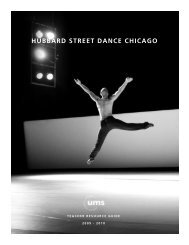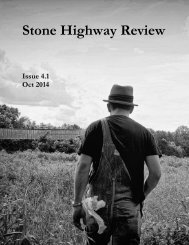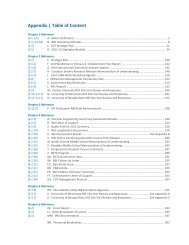Fries
Fries
Fries
You also want an ePaper? Increase the reach of your titles
YUMPU automatically turns print PDFs into web optimized ePapers that Google loves.
ICAME Journal No. 34of the OED reading program, these ambiguous usages would be systematicallyunderrepresented. Therefore he instituted a program of what he called ‘intensivereading’. He selected 69 texts of representative dates within the Early ModernEnglish period, made multiple photocopies of the texts (to eliminate scribalerror in copying them) and then made slips for essentially every instance of themajor vocabulary items in those texts. These slips provide information on thedistinctive environments that indicated that one or another of the meanings ofthe target word were being used in that instance. <strong>Fries</strong> called these distinctiveenvironments the ‘lexical sets’ for the various meanings. Although the term lexicalin lexical set seems to imply that he was particularly interested in the otherwords that appeared in the context (i.e. what we would now call ‘collocations’),in fact the discussions in <strong>Fries</strong> (1963: 104–105) 13 demonstrate that he alsoincluded phenomena which we would describe as colligations. In other words hedid not distinguish carefully between our two concepts.<strong>Fries</strong> took the third, quantitative approach to data in most of his largerprojects. This third approach to using corpora involves counting systematicallyand exhaustively the conflicting contrastive features of some aspect of the languagefound in the corpus. In other words it emphasizes paradigmatic relationsin the analysis of the data. Counting contrastive features allows one to identifypatterns in the use or development of the language. He expressed his reasoningin a lengthy passage in American English grammar (<strong>Fries</strong> 1940a: 34) where hedescribes how he intends to anayze the letters that constitute his data:In the attempt to gather, analyze, and record the significant facts fromany such mass of material as the specimens here examined, one cannotdepend upon some general impressions and note only the special formsthat attract attention. If he does, the unusual forms and constructions orthose that differ from his own practice will inevitably impress him asbulking much larger in the total than they really are. Those forms thatare in harmony with the great mass of English usage will escape hisnotice.And after discussing distortions of the representation of Vulgar English by writerssuch as H. L. Menken and comic writers he says (1940a: 35–36):In order to avoid errors of this kind we have in the study of thismaterial tried first to record all the facts in each category examined.For example every preterit and past participle form was copied on aseparate slip of paper in order that we might determine not only thekind of variety that existed in actual usage but also something of the104








